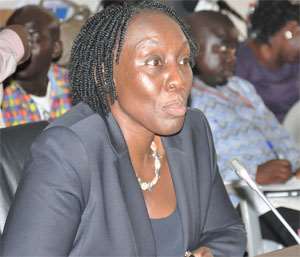
Marietta Brew Appiah-Oppong
The proposed amendment of certain aspects of the 1992 Constitution could be in jeopardy following a suit filed against the Attorney-General by Professor Stephen Kwaku Asare.
According to the Professor of law, the President has no power to set up a commission to initiate amendments or draft amendment bills to the Constitution as is currently being done.
He therefore, filed the suit at the Supreme Court challenging the executive arm of government for what he described as 'the President's usurpation of Parliamentary powers and misappropriation of Article 278(1).'
The plaintiff wants a declaration that 'the Constitution Review Commission of Inquiry Instrument, 2010, C.I. 64 is null, void and of no effect as it contravenes the letter and spirit of Article 289(1) of the 1992 Constitution, in that the effect, if not the intended purpose, of C.I. 64 is to usurp powers that the 1992 Constitution expressly, exclusively and specifically conferred to Parliament.'
He wants another declaration that the powers granted to the President under Article 278(1) to 'appoint a commission of inquiry into any matter of public interest' does not include the power to establish a commission to review and propose amendment bills to the Constitution where such powers to review and propose amendment bills to the Constitution have been expressly, exclusively and specifically conferred to Parliament.
The plaintiff further wants a declaration that Article 278(1) does not grant the President 'an all-purpose commissioning power' but only gives him the power to commission an independent inquiry to investigate and establish the truth relating to an entity's affairs, activities or some specific occurrence that is in the public interest.
Prof. Asare is praying the highest court of the land to declare that the Constitution Review Implementation Committee (CRIC) set up by the President to finalize amendment bills for both the entrenched and non-entrenched provisions is alien to the Constitution, among other reliefs.
Summary Of Particulars
Professor Stephen Kwaku Asare
It is the contention of the Plaintiff that 'the Constitution can only be amended by its terms' and added that 'Parliament is the sole body that can initiate, consider and propose amendments to the Constitution.'
'Parliament's power to amend the Constitution is not only plenary and exclusive, but also cannot be delegated to or usurped by the President… The President's role in constitutional amendment is limited to the ministerial task of giving assent to bills properly passed by Parliament,' the plaintiff averred.
By William Yaw Owusu




 MASLOC former boss sentenced to 10 years in prison with hard labour
MASLOC former boss sentenced to 10 years in prison with hard labour
 Convert National Cathedral site to tourist centre — Spio-Garbrah to govt
Convert National Cathedral site to tourist centre — Spio-Garbrah to govt
 2024 election: Don’t be scared; we're ready to maintain law and order – Dampare ...
2024 election: Don’t be scared; we're ready to maintain law and order – Dampare ...
 NDC to officially outdoor Prof Jane Naana as 2024 running mate on April 24
NDC to officially outdoor Prof Jane Naana as 2024 running mate on April 24
 ECG board members slapped GHS5.8 million fine by PURC for failing to alert publi...
ECG board members slapped GHS5.8 million fine by PURC for failing to alert publi...
 I never left NPP, they 'sacked' me for attending Alan's programme; even a $100mi...
I never left NPP, they 'sacked' me for attending Alan's programme; even a $100mi...
 Fuel prices go up today
Fuel prices go up today
 Anti-gay bill: Your stance serves no purpose; either you actively advocate for t...
Anti-gay bill: Your stance serves no purpose; either you actively advocate for t...
 Tension brews as NPP Seattle clashes with national leadership over parallel chap...
Tension brews as NPP Seattle clashes with national leadership over parallel chap...
 Anti-gay bill: You've done nothing in Ghana to prove you're against LGBTQ+; ther...
Anti-gay bill: You've done nothing in Ghana to prove you're against LGBTQ+; ther...
